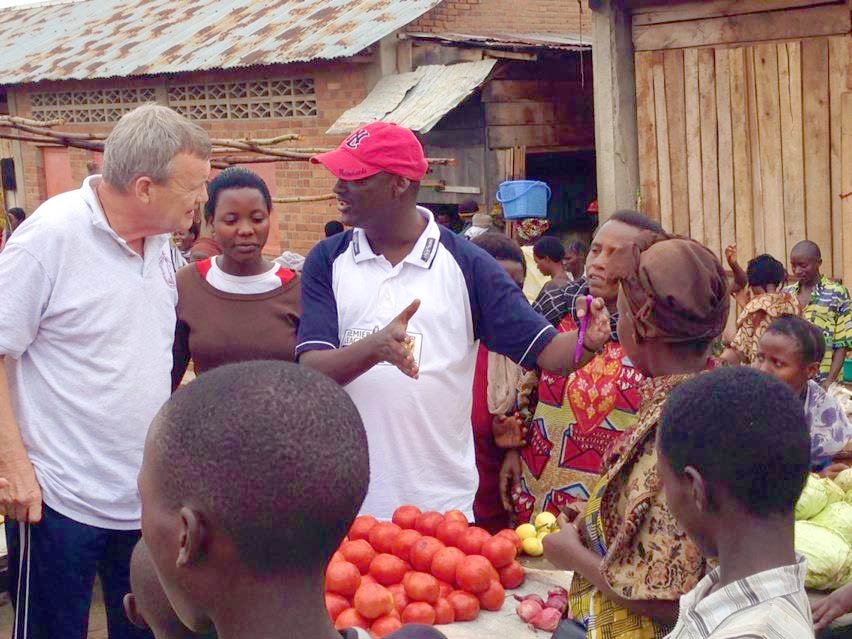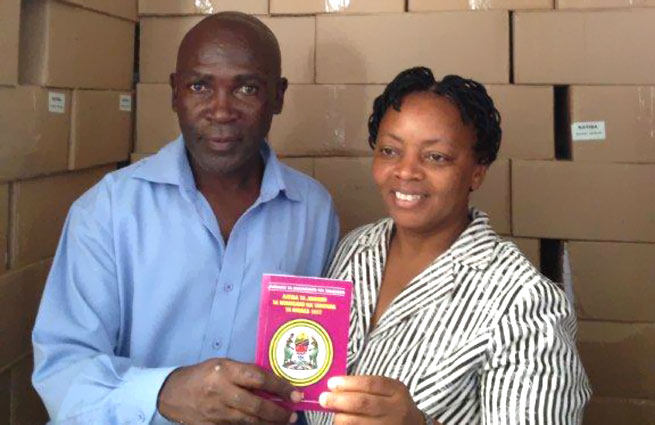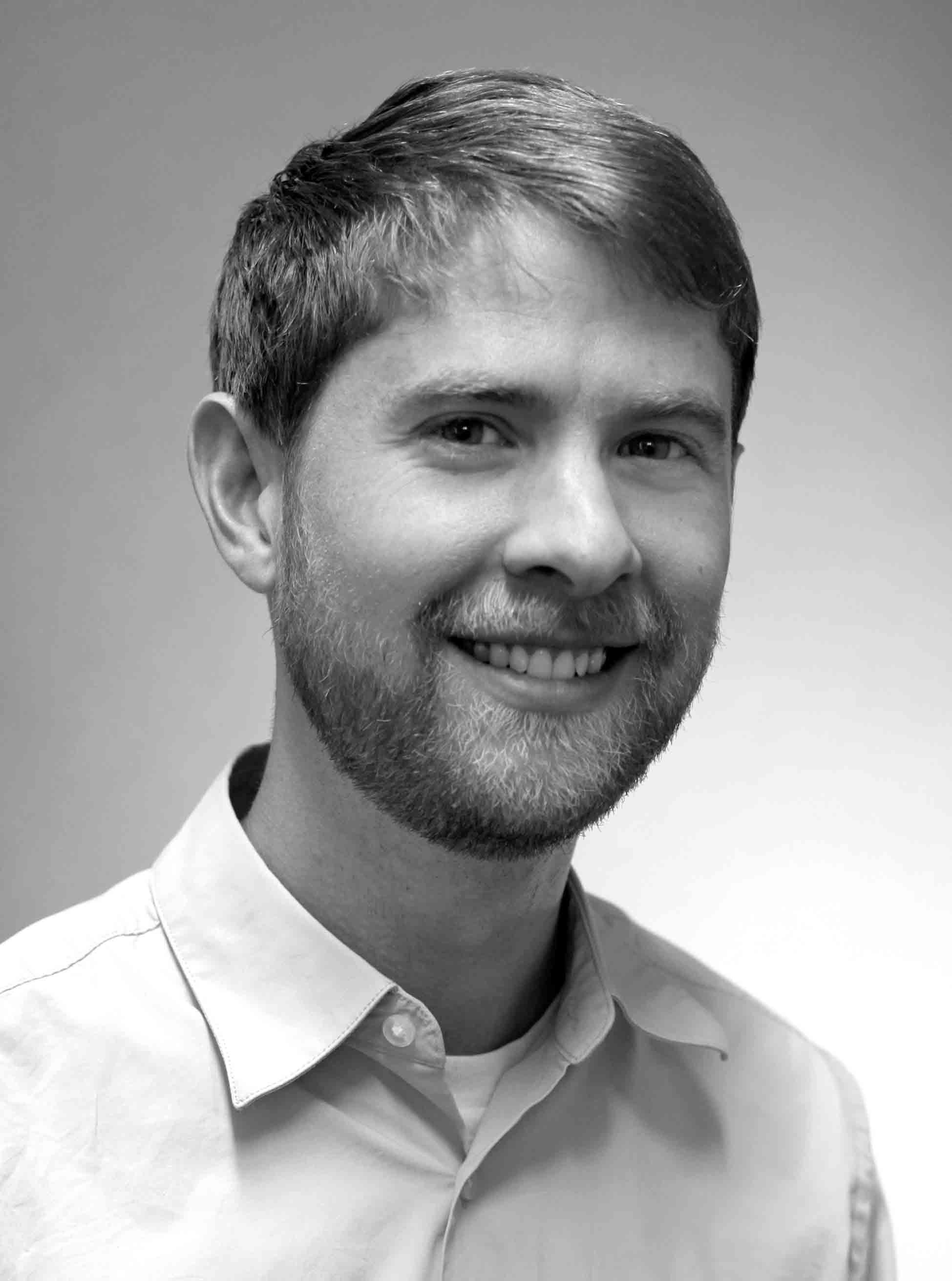
by Deva Jones | Nov 19, 2012 | Congregational Trip
The following post was written by Rev. Eric Cherry, director of the Unitarian Universalist Association’s International Office. Cherry was one of the leaders of the UUSC-UUA Supporter Journey to Tanzania and Burundi.
Service-learning trips through the Unitarian Universalist College of Social Justice (UUCSJ) are a terrific way for UUs to get to know the social justice strategies and methods of partners around the world. Many of the partners that UUCSJ interacts with through these trips are secular in their approach, but some of them are faith-based — and even Unitarian/Universalist. In those cases, the experience for trip participants offers a unique opportunity to connect spiritual practice and faith with outreach ministries. Introducing the team of UUCSJ service-learning participants in East Africa to the leaders and members of the Unitarian Church of Burundi was a great example of that connection. Together we explored the ways that Unitarianism is pursuing social justice work in Burundi.
The Unitarian Church in Burundi was established by Rev. Fulgence Ndagijimana in 2002 as a liberal religious alternative to the dominant Roman Catholic presence in Burundi. Rev. Fulgence is, in fact, a former Dominican novitiate who discovered Unitarianism while studying in seminary. After leaving seminary and pursuing a correspondence with a Unitarian minister in the United Kingdom, he was inspired to start the church in Burundi’s capital, Bujumbura.
Since then, the congregation has grown in strength, numbers, and outreach ministries. In 2011 the congregation dedicated the first Unitarian church building constructed in an African country in decades. And it serves as a home for their church services, as well as a meeting place for activists.
The outreach work of the church has taken many forms, including the following:
- Capacity building and advocacy work with Burundi’s Batwa community
- Domestic violence prevention through workshops and other intervention
- Supporting microfinance initiatives
- Partnering with a local school
- Establishing scholarship programs for university students
- Leading a coalition of Unitarian churches in development in Francophone African countries
All of the congregation’s work is done in the context of the slow recovery — and the struggle for truth and reconciliation — taking place in Burundi following its civil war. Burundi needs liberal religious leaders, and the Unitarian Church in Bujumbura is serving that role.
During the visit we were inspired by meetings with a former combatant who now operates a small restaurant and a team of women who are operating a vegetable stall at the women’s market in the city — all beneficiaries of the church’s microfinance initiative.
We also visited the local school that the church is partnering with. There, nearly 2,000 primary school students have found a secure place to begin their educational journeys. Through assistance from its partners, the Unitarian Church has helped the school bring electricity to its classrooms — and will now attempt to set up a water system for the school.
Participants in the university scholarship program also met with us. They explained how nearly all of them were the first people in their family to attend University, and that completing a degree is the fastest way to escape poverty in Burundi. We were inspired by the path they have chosen.
And, on Sunday, we gathered for church with 60–70 Burundian Unitarians. The singing was fantastic, the prayers centered on social justice, and the sermon by Rev. Fulgence was prophetic. He took a text from Jeremiah that advised those surrounded by devastation to build up their cities and display signs of hope. The members of the Unitarian church clearly appreciated and embrace his message. We visiting friends are challenged to do the same as we return to our homes.

by Deva Jones | Nov 14, 2012 | Congregational Trip
The following post was written by Patricia Jones, manager of UUSC’s Environmental Justice Program. She is currently coleading the UUSC-UUA Supporter Journey to Tanzania and Burundi.
The Tanzania Gender Networking Program (TGNP) is hosting a UUSC-UUA delegation of supporters in Dar es Salaam this week. Participants will join TGNP in their work on the constitutional process in the country. Tanzania’s political parties passed a very controversial law in 2012 that sounded the starting bell for the country to adopt a new constitution by the end of 2014. You may think three years is enough time. TGNP and civil society do not.
Yesterday we met with the founding members of TGNP and learned about their groundbreaking programs to raise awareness, mobilize grassroots constituents to demand their rights, and change law and policy to make the rights of women and men more real. The current constitution was adopted in 1977 and amended during the years since, but it contradicts itself, especially concerning the equality of men and women. In Tanzania, women may not inherit property, and marriage age for girls is 14 and for boys is 18 — but the constitution provides that all Tanzanian children have the right to education to the fullest of their potential. These “gaps,” as the Tanzanians call them, are just some of the issues TGNP is working to change. They want to see the human rights of the people — including the right to water, to health, and to education — more clearly expressed.
But they first had to reform the law that guides the process. In Tanzania, the constitution, all the laws, and the court decisions are in English. English is taught in secondary school, so Tanzanians who complete primary school only (to age 14) do not learn English. TGNP and their coalition partners at the Civil Society Constitutional Forum (CSCF) worked to require that the constitutional process be conducted in Swahili, the language the vast majority of Tanzanians use in daily life.
TGNP and CSCF are conducting civic education on the constitutional process. However, that is another “gap,” as they point out. The law passed by both ruling and opposition parties limits and regulates civic education. TGNP and CSCF must apply to conduct civic education on the constitution, disclose their funding for the program, and have the content authorized by the Constitutional Review Commission. If they violate this process, they could be fined 5 million Tanzanian shillings or be jailed for 3 years. This while the political parties are openly passing out talking points during the “open forums,” the first step in the constitutional process.
During our delegation visit, we saw boxes of the current constitution in Swahili at the CSCF offices we visited. They had printed them and are now distributing them. TGNP and CSCF want the time table changed; they want to slow the process down so people can learn about their constitution and what is at stake, and then be able to form their own opinions. The parties want to have the constitution wrapped before the 2015 elections.
Who knows what other surprises are waiting in the wings. Possibly land reform that would give away large parts of Tanzania to major foreign farming firms? That would privatize water rights? Diana, the director of CSCF, assured us they will include the human right to water. She had been without water in her home for the past week.
The delegation was inspired by the dedication, insightful analysis, persistence, and what cofounding member Subari termed the “love” that they express through their work. I agree, Subari, it is one of the highest expressions of love to dedicate your time and heart to changing the highest law of the land, the constitution.

by Deva Jones | Nov 6, 2012 | Congregational Trip
The following post was written by Evan Seitz, senior associate for service-learning programs with the UU College of Social Justice.
I am not graceful when preparing for trips. I fret about everything from which type of trail mix to bring to whether our hosts will meet me at the airport. However, for the upcoming UUA-UUSC supporter journey to Tanzania and Burundi my usual pre-trip jitters have been largely replaced by eager anticipation. I have never been to Africa, and I can’t wait to visit two great partners: the Tanzania Gender Networking Program (TGNP), based in Dar es Salaam, Tanzania, and the Assembly of Christian Unitarians of Burundi (ACUB) based in Bujumbura, Burundi.
Tanzania is currently rewriting its constitution and our partner TGNP is working on including language on the human right to water in that new constitution. Our delegation will be meeting with TGNP leaders to hear firsthand their stories on this process. We will also be visiting community partners of TGNP that have struggled to access safe, sufficient, affordable water for daily human consumption. At the end of our visit with TGNP, we will be visiting a representative of the Tanzanian Water Ministry to express our hope for a successful inclusion of the right to water in the new constitution.
In Burundi, we will be meeting Rev. Ndagijimana Fulgence, the minister of the newest Unitarian Church on the African continent. ACUB has an active social outreach ministry, and we will be meeting with community members who have benefited from this service. There will also be plenty of time to meet with members of the congregation. I am personally most excited about attending the service on Sunday; it will be only my second Unitarian service outside of the United States.
I am also looking forward to spending eight days with a stellar group of supporters and social justice activists. The seven delegation members come from all regions of the United States and bring a wealth of knowledge and experience. Joining me as trip leaders are my colleague Eric Cherry, director of the UUA’s International Office, and Patricia Jones, manager of UUSC’s Environmental Justice Program. Return for more updates from me and other delegation members as this exciting journey unfolds.



